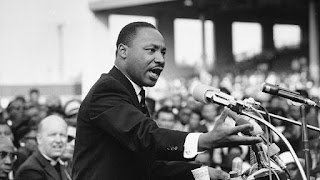When Followers Become Leaders and if it is Even Possible
I decided to embark on the Civil Rights Trip for quite a few reasons. I wanted to learn about unsung heroes of the Civil Rights Movement whom I never would have had the chance to learn about in school. I wanted to travel to new places. Most of all, I wanted to return to The Park School with the knowledge I needed to make a change in the community.
I may have mentioned this before in conversation or in another blog, but my school is kind of progressive. I say ‘kind of’ because the student body makes an effort to address current events and issues plaguing society, though we seldom do more than discuss. There are a lot of big voices at Park— people who always feel comfortable to speak in assembly— but I can’t help but wonder whether or not these voices accurately represent the feelings of the community. The upper school has, through speeches and open discussion platforms, tried to welcome a diversity of opinions; and I do not believe that it has made much of a difference. For if there are individuals who fear persecution and judgement, simply telling them to “get over it” is not an effective approach.
This trip has had an immense impact upon my understanding of leadership. And with this experience, I may now critique some ways the Park School handles things...
From what I understand, the students at Park care a lot. They spend their time reading and researching the topics and causes in which they are interested. However, they (myself included) tend to spread themselves too thin. Whether it be for the purpose of having a full college resume or simply for enjoyment, it seems that we have forgotten the idea of quality over quantity. Maybe it it just me... but I still think it is worth acknowledgement; the more responsibilities I take on, the worse my performance becomes in each one. Charles Mauldin once said that: “...leadership is acting for a cause and staying with it...” And I would not say that Park students lack dedication; I just challenge my classmates (if you all are reading this) to think about where and how they want to invest their time.
I say all of this to present an idea of how to cultivate leadership among students in the Park community. Leadership implies a certain amount of comfort and self assurance, in general. Maybe if more student leaders sought to spread their cause, contrasting opinions would be unearthed as a result.
————————————————————
Today, I was also prompted to think about the qualities that make a good leader— characteristics such as charisma, integrity, passion, etc. I always had this thought in the back of my mind, that I could become a leader, myself, someday. But that was challenged, when I had a discussion over lunch with Barbara Mines. Mines was one of many children who participated in protests organized at the 16th Street Baptist Church. Immediately as the other students and I became acquainted with her, she made it clear that she was not a leader of the movement. Of course she was aware of the cause and she felt the need to do her part, but she identified as a follower of the nonviolent principles of Dr. King. In fact, she stated:
“ Not everyone can be a leader; if that is the case for you, you must seek the right leader for yourself.”
After hearing this, I had a few questions (which I, unfortunately, did not get the time to ask). For example, how might one determine whether or not they are capable of being a leader?
To an extent, I disagree with Ms. Mines’s sentiment. I realized, upon further reflection, that there is no person who can embody all of your personal values... therefore, there is no perfect leader for everyone. But that takes me back to my point about choosing a cause: having a leader in only a single aspect of life keeps one from stretching themselves too thin.
I guess, I will keep this in mind. Maybe you should too... just some food for thought.
-Kendall C.
-Kendall C.




Comments
Post a Comment